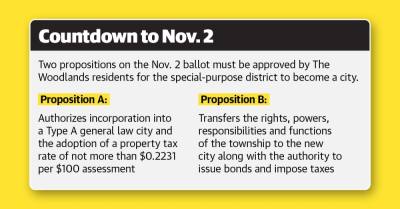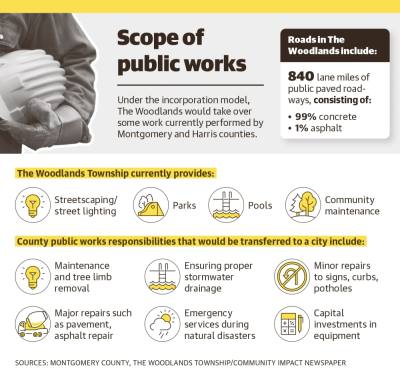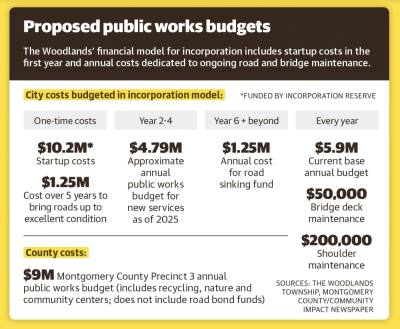Although political action committees exist on both sides of the issue, several elected officials in Montgomery County have publicly criticized aspects of the township’s 2020 incorporation study, such as the transition of public works and law enforcement services to a new city.
Meanwhile, the township has issued statements defending its financial model and addressed statements at several public meetings. Its financial model for incorporation, which was updated in August, was also publicly critiqued in a set of reports commissioned by The Howard Hughes Corp.
Montgomery County Sheriff Rand Henderson has said he has concerns about the plan for law enforcement in the township’s May 2020 incorporation study and financial model, although the county has signed a four-year transition agreement with the township in the event incorporation occurs. The plan calls for a gradual movement of patrol officer positions from the county to a city department.
“If [residents] are happy, why would they look to change that?” Henderson said of the current county contracts for law enforcement. “That’s the reason a lot of businesses locate in The Woodlands, ... because of the safety provided by the sheriff’s department.”
However, township officials said the financial models through which a city of The Woodlands would budget for police and public works are fully funded with plans to maintain current levels of safety and service without raising the tax rate. The maximum initial tax rate proposed under incorporation is $0.2231 per $100 assessment, the same as the current rate.
James Thurmond, director of the Master of Public Administration program at the University of Houston who has researched governance in The Woodlands, said the township already has most of the structures in place needed to govern as a city. He noted there would be a transition period between a successful election and the date those services were fully the responsibility of The Woodlands.
“Even if it was the next day, they’d be prepared for it; they have everything in place to be a city,” said Thurmond, who specializes in public administration and spent 30 years as a city manager.
However, Montgomery County Precinct 3 Commissioner James Noack said he believes the experience and infrastructure present in the county cannot be duplicated by a newly formed city.
“You are going to lose the institutional knowledge, the expertise, the people who serve you today. ... Who is going to be doing that Nov. 3?” Noack said at a Sept. 15 forum hosted by the chamber of commerce.
County services would continue through the 2021-22 budget year before the township took over aspects such as public works, officials have said.
County services
The township’s incorporation financial model includes $16.8 million in new costs that would be assumed by the city of The Woodlands. Monique Sharp, the township’s assistant general manager for finance and administration, said those costs could be made up by new revenues as well as projected sales tax revenue increases. Many of the new costs are for services such as public works and law enforcement. Montgomery County Precinct 3 and Harris County Precinct 4 are currently responsible for those services. A future city in The Woodlands would expand its public works facilities to add those services the township provides, such as streetscape management.
Noack said road projects in unincorporated areas such as The Woodlands are funded by a growing tax base throughout the county. In contrast, population growth in The Woodlands is expected to level out since it has nearly reached residential build-out and has no extraterritorial jurisdiction to expand its boundaries, Noack said.
“Right now the county pays. ... When it’s The Woodlands, it’s just the taxpayers of The Woodlands [funding expenses],” Noack said.
As a city, road responsibilities would be transferred to The Woodlands. There are about 840 lane miles of roadway in the township, according to the county. The only roads that would not be transferred to the potential new city would be state or federal roadways, which include Hwy. 242.
Noack said the annual budget for the Precinct 3 commissioner’s office is $9 million, which includes salaries, benefits and operating costs as well as operating a Nature Center and recycling center.
Aside from these routine annual costs, however, Noack said responsibilities would also entail following a process for larger road improvement projects, from initial studies and engineering and design plans to the final construction and inspections.
“The new city would be responsible for all capital investments for heavy equipment/vehicles necessary to perform these functions, of which some of these vehicles cost several hundred thousand dollars apiece,” Noack said in an email.
Township officials said the proposed city’s public works needs are amply funded. Consultants from Raftelis, formerly The Novak Consulting Group, said in addition to existing annual township funds for public works, such as streetscape maintenance—about $5.9 million—the incorporation model provides $4.8 million in new annual operating costs for public works. It also provides $1.25 million annually for ongoing road maintenance and $250,000 annually for shoulder and bridge maintenance. Additional costs include $10.2 million in startup and equipment costs over the first five years to be funded through incorporation reserve funds. Township officials said a future city would also not need to fully purchase all needed equipment immediately.
“The reality is there is county providers that can contract, private providers that can contract; the township can onboard the equipment and staff it needs as a public works department,” said Gordy Bunch, chair of the township board of directors. “One thing that has changed is that the township has acquired the Brazos Transit District [facilities for The Woodlands trolley] in our area, so we do not have to buy land and build from scratch.”
Sheriff’s concerns
The law enforcement services provided through contracts with Montgomery and Harris counties are likewise the subject of discussion and debate. In September, a critique leveled at the law enforcement portion of the township’s May 2020 incorporation study was released by The Howard Hughes Corp. The law enforcement critique was authored by two retired Houston Police Department officials.
Sharp addressed the critique at Sept. 16 and 30 township meetings, noting the retired officials’ report was based on the May 2020 incorporation financial model, which was based on information from fiscal year 2019-20. Sharp said the township updated that model with new information after the study process was paused and resumed in 2021.
Sharp said the Hughes consultants’ critique failed to acknowledge funds in the township’s base budget or the revised FY 2021-22 financial numbers she shared in an Aug. 13 presentation. For example, the Howard Hughes critique stated the May 2020 incorporation model did not account for $12 million to $14 million in necessary law enforcement costs due to new contracts negotiated in late 2020 and general cost-of-living increases.
Township officials said those alleged understatements were more than made up for in the financial information presented Aug. 13, which included a higher base budget amount of about $14 million annually as well as up to $9 million in additional projected revenue from sales tax revenue and other sources.
However, Henderson said he believes the consultants’ critique better explains the cost of running a police department than the incorporation study.
“Leaders in law enforcement had some concerns about the validity of those numbers [from the May 2020 Novak study], so whenever I saw the study from [retired Houston Police Department executive assistant] Chief [Timothy] Oettmeier, who I have a lot of respect for, these were much more valid numbers and really spoke to what it takes to run a police department,” Henderson said.
Henderson said his departmental budget is set by Montgomery County Commissioners Court. The Woodlands funds 92 patrol deputies in addition to the regular county staff for enhanced services. He said future contacts between The Woodlands and the county beyond the date of the transition agreement through 2025 could not be estimated.
“The county has expressed reservations about continuing to contract,” he said. “Under incorporation] ... we’d have to work with another entity there, and it would change the face of law enforcement.”
Question of timing
The Woodlands Area Chamber of Commerce’s board of directors voted Sept. 24 to pass a resolution opposing incorporation, citing concerns relating to finance and law enforcement as well as previous statements the township would not hold the election in an odd-numbered year.
“We believe there is no reason to rush to become a city,” said J.J. Hollie, CEO and president of the chamber.
The decision to put the measure on the ballot was made by The Woodlands officials one business day before the Aug. 16 deadline this year because updated financial information from county tax rolls was not available until early August.
The chamber resolution also states a new city would include a “new tax rate, new city service charges and a new taxing authority while creating no new services.”
Township officials have said some of the new revenue streams in a future city would come from new fees and fines it could impose.
Thurmond said despite arguments that incorporation would be a significant change, The Woodlands is only lacking several formal powers that incorporation conveys. Thurmond said in other respects, The Woodlands is already behaving as a city in many aspects of its governance.
“If you don’t have the authority to have ordinances, you don’t have the same authority as a city. ... It is much more powerful than a county,” he said.
Julie Turner, president of the Texas Patriots PAC that has endorsed incorporation, said the PAC believes the additional powers conveyed by a city would be an asset.
“A city would belong 100% to the residents and would have the authority to deal with the major challenges facing The Woodlands now—overdevelopment and clear-cutting, traffic, and flooding,” she said.
However, township director Ann Snyder, who voted against putting the measure on the ballot this year, said in a written statement her reservations remained.
“I cannot in good conscience condone the process that has led us to this point, nor ignore the concerns of residents questioning the wisdom of making this ... change to the community,” she said in the statement.
Andrew Christman contributed to this report.









